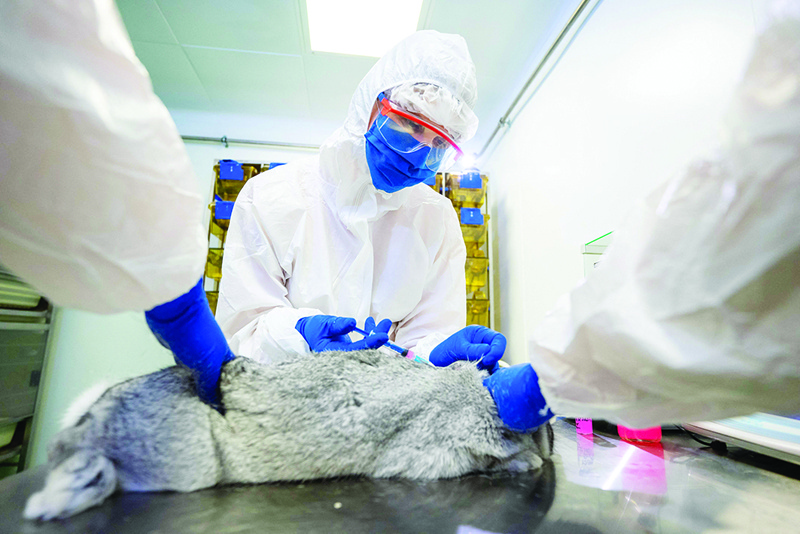 RUSSIA: This handout picture taken on Dec 9, 2020 shows specialists working on the development of a coronavirus vaccine for animals (Carnivak-Cov) at a laboratory of the federal center for animal health. - AFP
RUSSIA: This handout picture taken on Dec 9, 2020 shows specialists working on the development of a coronavirus vaccine for animals (Carnivak-Cov) at a laboratory of the federal center for animal health. - AFPGENEVA: Two Chinese coronavirus jabs are safe and effective, WHO experts said yesterday after reviewing partial data, providing a potential boost to countries from Australia to Europe struggling to roll out vaccines fast enough. Fewer than 600 million jabs have been given out across the world, three months after vaccination programs began in earnest in Western countries and leaders hailed the drugs as the only safe way out of punishing lockdowns.
Vaccine specialists at the World Health Organization did not issue any advice on how to use China's jabs, saying they would wait until a decision had been taken on whether to grant them emergency licenses. The experts said the vaccines from Sinovac and Sinopharm "lacked data" for older age groups and people with medical conditions other than COVID.
Another vaccine maker, Pfizer-BionTech, was pushing ahead with its plans to ramp up production and rollout - saying yesterday new data from the US showed its jab was 100 percent effective on 12 to 15-year-olds. The firm said it wanted to start vaccinating youngsters in the US before the start of the next school year.
The US has already rolled out almost 150 million vaccines doses, far more than any other country. But it has also suffered more than 550,000 deaths, the highest death toll in the world. Globally, the virus has killed more than 2.8 million people since it emerged in the Chinese city of Wuhan in late 2019.
Kuwait yesterday registered five deaths and 1,282 new positive cases of COVID-19 in the past 24 hours. Health Ministry Spokesman Dr Abdullah Al-Sanad said this takes the country's death toll to 1,313, while total cases swelled to 232,103. He added 1,330 more people recovered from the virus, taking total recoveries to 226,580. Sanad revealed 241 people are in intensive care units, while 14,210 others are receiving medical treatment. He pointed out that 9,175 swab tests were conducted in the past 24 hours, taking total tests to 3,056,468.
Large parts of Europe are battling high infection rates, with most of the continent still living under lockdowns or other restrictions. French President Emmanuel Macron, who has repeatedly vowed not to reintroduce a national lockdown, is under increasing pressure. In Paris, intensive care beds are running low and infection rates are approaching last year's peak, pushing medics to breaking point.
The cycle of restrictions and infections is not over in China either, where a city on the Myanmar border faces lockdown - the first such move in months. All residents in the city of Ruili will be tested for the virus and everyone will have to observe "home quarantine" for a week after six cases were detected, say officials.
Australia, largely free of COVID infections, still faces a huge challenge to get jabs into arms, especially since some countries have started blocking exports to what they regard as a low-risk region. So far, just 670,000 doses have been administered, well below initial plans to vaccinate four million people by the end of March.
Even further behind is war-torn Yemen, which accepted its first delivery of jabs yesterday. Doctors Without Borders (MSF) said it had seen a "dramatic influx" of critically ill COVID-19 patients in Aden and other parts of Yemen. With the rest of the world scrambling to catch up with the US, the positive signals from the WHO on the Chinese jabs could be crucial. However, WHO experts pointed out that neither had yet received authorization by what the UN agency considered "a stringent regulatory authority".
Russia announced yesterday it had registered what it said was the world's first coronavirus vaccine for animals, describing the step as important to disrupting mutations. The agriculture oversight agency Rosselkhoznadzor said the vaccine called Carnivak-Cov had been tested beginning October on dogs, cats, mink, foxes and other animals and was proven to be effective. "All test animals that were vaccinated developed antibodies to coronavirus in 100 percent of cases," said Konstantin Savenkov, deputy head of Rosselkhoznadzor. "It is the world's first and only product for preventing COVID-19 in animals," he said.
The COVID crisis has pushed health systems to the brink, brought huge challenges for policymakers and devastated the global economy. But Britain released economic data suggesting it had bounced back stronger than expected in the second half of last year. Overall output expanded by 16.9 percent in the third quarter, stronger than the 16.1 percent predicted. - AFP










